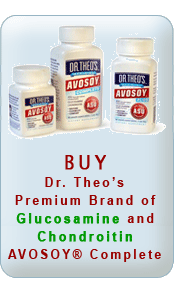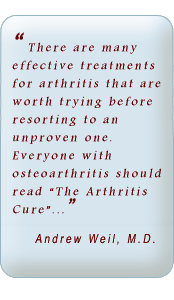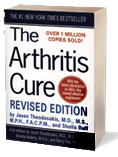Medical Evidence
Glucosamine and Chondroitin for Treatment
of Osteoarthritis A Systematic Quality Assessment and Meta-analysis
Timothy E. McAlindon, DM; Michael P. LaValley, PhD;
Juan P. Gulin, MD; David T. Felson, MD
Context: Glucosamine and
chondroitin preparations are widely touted in the lay press as
remedies for osteoarthritis (OA), but uncertainty about their
efficacy exists among the medical community.
Objective: To evaluate benefit
of glucosamine and chondroitin preparations for OA symptoms using
meta-analysis combined with systematic quality assessment of clinical
trials of these preparations in knee and/or hip OA.
Sources: We searched for
human clinical trials in MEDLINE (1966 to June 1999) and the Cochrane
Controlled Trials Register using the terms osteoarthritis, osteoarthrosis,
degenerative arthritis, glucosamine, chondroitin, and glycosaminoglycans.
We also manually searched review articles, manuscripts, and supplements
from rheumatology and OA journals and sought unpublished data
by contacting content experts, study authors, and manufacturers
of glucosamine or chondroitin.
Study Selection: Studies
were included if they were published or unpublished double-blind,
randomized, placebo-controlled trials of 4 or more weeks' duration
that tested glucosamine or chondroitin for knee or hip OA and
reported extractable data on the effect of treatment on symptoms.
Fifteen of 37 studies were included in the analysis.
Data Extraction: Reviewers
performed data extraction and scored each trial using a quality
assessment instrument. We computed an effect size from the intergroup
difference in mean outcome values at trial end, divided by the
SD of the outcome value in the placebo group (0.2, small effect;
0.5, moderate; 0.8, large), and applied a correction factor to
reduce bias. We tested for trial heterogeneity and publication
bias and stratified for trial quality and size. We pooled effect
sizes using a random effects model.
Data Synthesis: Quality scores
ranged from 12.3% to 55.4% of the maximum, with a mean (SD) of
35.5% (12%). Only 1 study described adequate allocation concealment
and 2 reported an intent-to-treat analysis. Most were supported
or performed by a manufacturer. Funnel plots showed significant
asymmetry (P.01) compatible with publication bias. Tests for heterogeneity
were nonsignificant after removing 1 outlier trial. The aggregated
effect sizes were 0.44 (95% confidence interval [CI], 0.24-0.64)
for glucosamine and 0.78 (95% CI, 0.60-0.95) for chondroitin,
but they were diminished when only high-quality or large trials
were considered. The effect sizes were relatively consistent for
pain and functional outcomes.
Conclusions: Trials of glucosamine
and chondroitin preparations for OA symptoms demonstrate moderate
to large effects, but quality issues and likely publication bias
suggest that these effects are exaggerated. Nevertheless, some
degree of efficacy appears probable for these preparations.
Source: JAMA. 2000;283:1469-1475
Dr. Theo’s Comments: This
analysis of 15 of the 37 glucosamine and chondroitin studies is
a nice review but, since it was written before 11/99, it's missing
some of the critical studies presented at the American College
of Rheumatology annual meeting in Boston. I find it very interesting
that chondroitin was shown to have a much more profound effect
than glucosamine. This is of great concern to me since most of
the condroitin-containing products on the market either skimp
on the dosage (less than 800 mg per day appears to be useless)
or trick people by substituting non-effective substances such,
Hydrolyzed collagen, gelatin or low-chondroitin shark products.
In addition, the authors did not look the studies which showed
the structure-improving properties of the supplements. Nevertheless,
it is a pleasure to finally see these supplements listed in some
of the more common, mainstream journals, such as JAMA. This type
of national coverage is what I had hoped would happen when I wrote
The Arthritis Cure in 1996.




